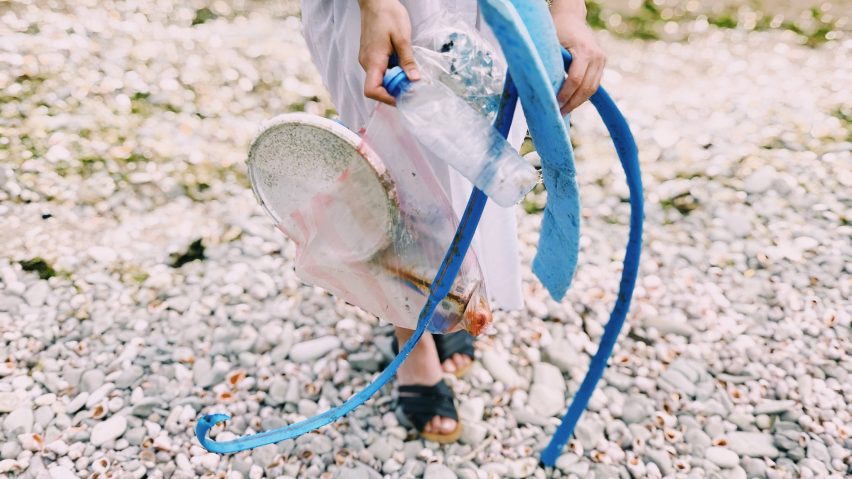The European Parliament has voted for a ban on single-use plastic, on items for which alternatives already exist, in a bid to mitigate ocean pollution – a move that has been largely praised by architects, designers and brands.
The proposals, which were approved in principal this week, will see single-use plastic items including cotton buds, cutlery, plates, straws, drink stirrers and balloon sticks banned in all EU countries by 2021.
According to the European Commission, more than 80 per cent of marine litter is made up of plastics, with the products included in these restrictions constituting over 70 per cent of this figure.
These plastic products collect in seas, oceans and on beaches across the world, and are ingested by marine wildlife, including some species that are consumed by humans such as fish and shellfish.
Plastic waste impacts economy as well as environment
"While plastics are a convenient, adaptable, useful and economically valuable material, they need to be better used, re-used and recycled," said the European Commission.
"When littered, the economic impact of plastics encompasses not just the lost economic value in the material, but also the costs of cleaning up and losses for tourism, fisheries and shipping."
Products made of oxo-degradable plastics, like bags or packaging, and fast-food containers made of expanded polystyrene are also included on the list of plastic items that will be banned from the EU market.
Ban won't apply to items without plastic-free alternatives
However the legislation, which was passed with 571 votes to 53, will not apply to items with no readily available alternatives.
Single-use burger and sandwich boxes or food containers for fruits, vegetables, desserts and ice creams will not be banned. Instead, EU member states will be pressed to reduce volume by at least 25 per cent by 2025.
They will be asked to collect recyclable plastic items, such as beverage bottles, separately. The target is for 90 per cent of these items to be recycled by 2025.
We all need to contribute to change, says IKEA
IKEA has praised the move, as a step towards creating a circular economy.
The announcement comes four months after the Swedish retail giant announced its own plans to remove all single-use plastics from its product range by 2020.
"IKEA is on a journey to become a circular business in all aspects," sustainability manager Lena Pripp-Kovac told Dezeen. "Accelerating Europe's transition to a circular economy is a team effort and requires a true commitment from many different groups – including policymakers, politicians, businesses and consumers."
"We all need to contribute to the change. As announced on June 2018, by 1 January 2020 single-use plastic products will be removed from the IKEA home furnishing product range globally," she continued.
"We recognise that single-use plastic can pollute ecosystems, such as oceans and waterways, and harm wildlife, when it is not disposed of responsibly."
Bring it on, say architects and designers
Architect Je Ahn, principal of London-based Studio Weave, can't see why the proposal wasn't introduced sooner. He puts a lot of plastic-waste pollution down to bad habits and laziness.
"I don't know why we – yes, still 'we' – haven't done this years and years ago. I'm very happy with the decision," Ahn told Dezeen. "I'm sure it will affect me in many ways, mainly on my bad habits of blaming unjustifiable 'inconveniences'. Bring it on!"
Benjamin Hubert, founder of design studio Layer, shares this view, marking the proposal as "a really positive step forward that should be embraced well before 2021 by manufacturers, retailers, hospitality and designers alike".
"My studio and I work with some very influential packaging companies and have structural packaging programmes running that look to eradicate single-use plastics, so in a way we have been working in this mindset for some time," Hubert told Dezeen.
"We hope this vein of sustainability-first continues – legislation is the most effective tool for change and it's about time these steps are taken before it's too late."
Beware of blanket bans, warns Istanbul Biennial curator
Not all designers are in complete support of the plans. Belgian design critic and teacher Jan Boelen, curator of the Istanbul Design Biennial 2018, has issued a warning that blanket bans can be dangerous.
Not all single-use plastics are problematic, he said. He claims that "the application of the plastic product" must always be considered.
"Plastic is fantastic if well used – plastic chairs can serve for 50 years, and that is single use," he told Dezeen. "We should not ban these kinds of products"
"It should be about an appropriate and well-designed relation of time and use or function – the application of the plastic product," he added.
In a recent interview with Dezeen, Boelen stated that the rising use of recycled plastic in design is "bullshit", and designers should instead use bioplastics made from natural materials such as algae if they really want to reduce pollution.
According to the critic, the trend for making products out of reclaimed plastic helps perpetuate the dependence on fossil-based polymers. "It's doing nothing. It's not changing the fundamental problem we have," he said.
The moves follows a recent warning from the UN that we have 12 years to take action against climate change, to avoid global disaster.
At this year's Dutch Design Week, Dezeen hosted a special edition of the Good Design for a Bad World series to ask if design can harness the power of the anthropocene – the first geological era in which human activity is the dominant influence on the earth's geology – to combat this issue.

